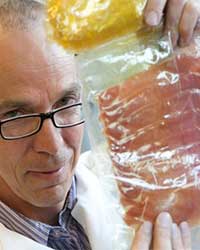 |
 |
E-News Update January 2011 |
LEAD FEATURE |
COMPANY NEWS |
MATERIALS NEWS |
MACHINERY NEWS |
EXHIBITION NEWS |
RUBBER JOURNAL ASIA |
INJECTION MOULDING ASIA |
Materials News
Intelligent packaging indicates spoiled food
 |
Freshness indicators typically take the form of labels inserted in a package but these come at a significant cost. Strathclyde researchers are looking to create a new type of indicator which is an integral part of the packaging and so is far less expensive.
The project has received £325,000 in support from the Scottish Enterprise Proof of Concept Programme.
Professor Andrew Mills, of the Department of Pure and Applied Chemistry, who is currently leading the Strathclyde project, said, "At the moment, we throw out far too much food, which is environmentally and economically damaging. Modified atmosphere packaging is being used increasingly to contain the growth of organisms which spoil food but the costs of the labels currently used with it are substantial. We are aiming to eliminate this cost with new plastics for the packaging industry."
By giving a clear and unambiguous sign that food is beginning to perish, the indicators being developed at Strathclyde could resolve potential confusion about the different significances of "best before" dates and "sell-by" dates. They could also help to highlight the need for food to be stored in refrigerators that are properly sealed.
It is estimated 8.3 million tonnes of household food, most of which could have been eaten, is wasted in the UK each year.